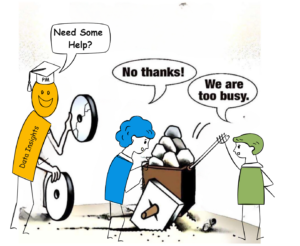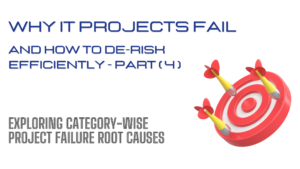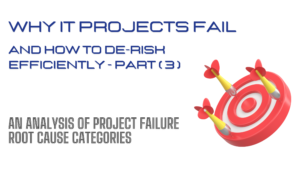Why do IT Projects fail - and How to de-risk them efficiently (Part 3)
Project failures, and Major Root cause categories
Project failures – Major Root cause categories
Linking back:
In the previous article in this series, we talked about the “Project risks & the cost of risk management“, and its relevance in the space of Project failures & its prevention.
Why categorize Projects ahead of Risks identification?
The type of project and the scope of the Project stages together largely determines the depth & breadth of risk management & its intensity.
For example:
An Exploratory project using nascent technology is far more likely to fail, due to the research-intensive nature.
There is a significant dependence on the skills of the team & the coherence within the team; There is also possibly a big impact of luck. In research, it may be possible for a Research team to take a wrong path and spend considerable time & money on that path, before realizing that the path is not feasible/ viable. At this time, the project can progress only with continued sponsorship.
Engaging the right team with the appropriate skills, adopting the right tools & frameworks, etc are some of the avenues for reducing risk in this scenario.
An ERP upgrade project (Eg: A SAP upgrade) may not be as complex.
Teams that have executed similar SAP upgrades in the past may have encountered the potential issues, and have solved them earlier.
These Project types would hence carry differing levels of risk, and necessitate possibly very different Risk mitigation actions.
More importantly, the severity of impact would also be very different, and hence the risk mitigation actions would carry differing intensity, and would require differing levels of follow-ups.
Root cause categories
In the above context, it is very important to identify the categories of Risk root causes, so that appropriate solutioning can be performed.Project drivers & Reins of control
This is probably the most fundamental root cause category.What is driving the need for a specific project?
Who is driving the project?
Is it something that affects Life on earth for a large number of individuals?
Is it a Government mandate or Compliance requirement?
Is it a Corporate strategic initiative?
Is it time-sensitive?
The motivation for the project will determine the bandwidth for failure/ cost of failure, etc.
This would, in turn, affect the need for Risk mitigation to the maximum extent.
The right people, the right focus
In Project management terminology, we call this “Stakeholder Management”.Engaging the right Stakeholders, achieving the right consensus & prioritization of project goals, etc are absolutely key to project success.
The preparedness of the team
The Process maturity of the Customer team & the Delivery team would drive potential for failure/ success, very significantly.Scope aspects
Defining scope appropriately, and then managing changes to scope efficiently, is very fundamental to project success.Process & Management aspects
The right Project management methodology, the right process frameworks, the right tools, and the right team that has familiarity with these, will bring down Risk potential significantly.Skills & Performance aspects
Irrespective of the model for Team engagement – Internal hires, Contractors, Outsourced firms, Freelancers, etc – the Management team must be clear about the Skills & Skill levels needed, and the Team charter, so that the team can operate smoothly as a single entity. Further, the team must also know & accept the Team charter, so that alignment is achieved.Change management aspects
A Project is successful only when it is deployed & adopted to the appropriate extent.Many projects fail at this stage due to lack of appropriate preparation.








